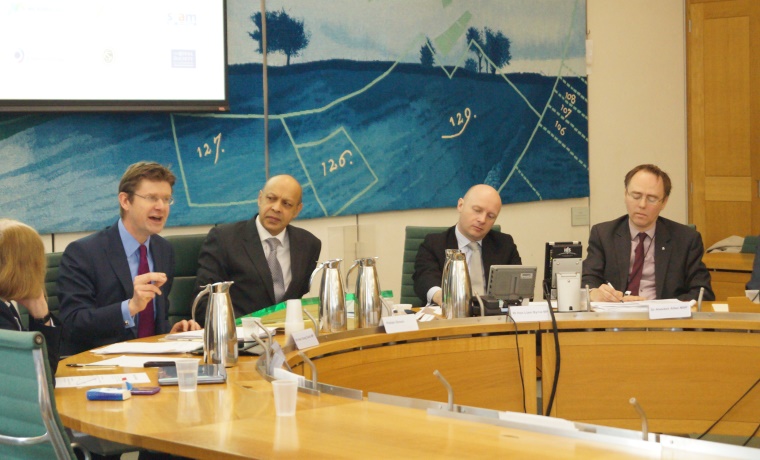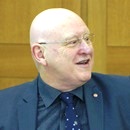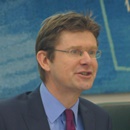The Future of Science

In the run-up to the general election, the Society held a parliamentary event to discuss the political stances of the UK's main parties on issues affecting science. Tom Ireland reports
The Biologist 62(2) p24-37
Seven-way political ding-dongs are all the rage this year. Somewhat surprisingly, the buildup to the 2015 election has been dominated by the format of the TV leaders' debates, with the growing influence of smaller parties causing headaches for both politicians and broadcasters.
Not wanting to miss out, the Society held its first parliamentary hustings in March, inviting representatives from seven of the UK's political parties to discuss their views on science ahead of May's general election. As well as the Society's debate, the British Ecological Society (BES) held a six-way discussion on 'people, politics and the planet'.
The good news is there is plenty of consensus among political parties when it comes to science. All of them acknowledge both the intrinsic value of science to society and its value to the UK economy.
However, the supply of resources and skilled scientists to the sector often depends on wider political issues, such as immigration, education and fiscal policy – and it's here where the parties differ.
Plaid Cymru (Party of Wales)
 The post-election priority for Plaid's Hywel Williams would be to secure more funding for Wales – at least as much as Scotland gets. He said it must be recognised that innovation can happen anywhere, including rural north west Wales, and not just in England's top higher education institutes. Wales has a great history of scientific innovation, but needs more money, he added.
The post-election priority for Plaid's Hywel Williams would be to secure more funding for Wales – at least as much as Scotland gets. He said it must be recognised that innovation can happen anywhere, including rural north west Wales, and not just in England's top higher education institutes. Wales has a great history of scientific innovation, but needs more money, he added.
Williams said he and his six brothers and sisters were all given the chance to complete higher education, despite their poor background. The current way of funding higher education would prevent similarly large families from sending their children to university. He recognised the need to secure long term funding for Welsh universities, which currently charge a maximum of £3,000 in tuition fees rather than the £9,000 in England.
Conservatives
 Greg Clark has only been the Government's science minister since July last year, but he recently published a 10 year Science and Innovation Strategy. His predecessor, David Willetts, was admired by many in the science community for having a good understanding of the issues affecting scientists in the UK.
Greg Clark has only been the Government's science minister since July last year, but he recently published a 10 year Science and Innovation Strategy. His predecessor, David Willetts, was admired by many in the science community for having a good understanding of the issues affecting scientists in the UK.
The coalition has protected the science budget and the Conservatives have promised to increase capital spending in line with inflation over the next five years. In an exclusive interview with The Biologist, Clark said his enthusiasm for science as a key investment for the UK was shared throughout Government right up to Chancellor George Osborne and Prime Minister David Cameron.
At the Society's hustings event, he countered opposition promises on spending by saying that the amount of money available for science was dependent on how the economy overall is performing.
"Liam [Byrne] is not really able to properly say how much can be spent that far ahead. When it comes to a spending review that all parties will have to do following an election, I think you can see the demeanour of our party when it comes to science. We have committed to a capital budget that is rising above inflation for the next Parliament."
In the face of criticism of the Government's immigration policies, Clark pointed to UCAS figures that suggest the number of foreign students applying to study in the UK is actually due to rise by 4% this year. On tuition fees, he said there had been a 10% jump in students going to university from underprivileged backgrounds, thanks to access grants paid for by the increased fees. "Liam's idea requires universities to go cap in hand to the treasury asking for billions of pounds each year," he said.
At the BES political hustings in London, Conservative peer Lord de Mauley said the Government still had "much to do" on the environment. But he said the coalition has achieved three-quarters of the aims set out in its environment white paper.
Labour
 Shadow science minister Liam Byrne said Labour would ring-fence science funding for the next 10 years, and that his post-election priority would be to ensure England's higher education system was sustainable.
Shadow science minister Liam Byrne said Labour would ring-fence science funding for the next 10 years, and that his post-election priority would be to ensure England's higher education system was sustainable.
Labour recently announced plans to reduce tuition fees from £9,000 to £6,000. The £3bn shortfall would be funded by increasing tax revenues from high earners' pensions. "The university funding system is going to go bust because three-quarters of students can't afford to pay back their loans," Byrne told delegates.
Byrne has repeatedly said that Germany's aim to spend 3% of its GDP on research and development is a "good ambition" for the UK, but it was not an official Labour party policy. He also said he hoped greater access to cloud computing could lead to "collaboration between scientists like never before".
On wider issues, Byrne claims that the Government's current fiscal and foreign policy is limiting the skills and resources available to UK science. He claimed Labour was in a better position to support science because it wouldn't cut public spending as much as the Tories. "Taking £55bn out of the public spending budget would be a disaster for science, and jeopardising our relationship with the EU will be a disaster for science."
At the BES debate, the shadow minister for the natural environment, Barry Gardiner, said the Government should recognise the ties between the environment, health and economics, and said Labour would introduce stricter regulations on fracking.
Green Party
 The Green Party was unable to field a representative for the Society's pre-election debate on science, not helping the party's poor history of engaging with scientists on issues such as the genetic modification of crops.
The Green Party was unable to field a representative for the Society's pre-election debate on science, not helping the party's poor history of engaging with scientists on issues such as the genetic modification of crops.
On more traditional environmental issues, however, the party is much more comfortable. Party leader Natalie Bennett appeared at the BES's debate on environmental policy to say her priorities were a move to green power as soon as possible, the establishment of a network of marine reserves, a reduction of waste and greater steps to protect UK soils.
"We advocate a return of power to local communities with a message from the centre to protect ecologies," she said.
UKIP

The party's proposed points based immigration system would not stop students and scientists coming to the UK, she said, before suggesting that reducing the number of migrants from the EU would mean the Government could accept more people from the rest of the world.
Despite claiming UKIP were pro-science, Reid did the party no favours by declaring at the start of the Society's debate that she is a climate change "realist" not sceptic who "challenges the current orthodoxy on climate change".
At the BES debate, UKIP spokesman William Cash also said the party was "the pro-countryside party". But his environmental proposals were entirely based around aesthetic issues such as wind farms and HS2, which he said were part of a "cult of ugly" ruining the natural world. He supports fracking, however, as the process can be "covered by big screens".
Liberal Democrats
 Dr Julian Huppert said his post-election priority would be to ensure the Government started publishing all the research it commissions.
Dr Julian Huppert said his post-election priority would be to ensure the Government started publishing all the research it commissions.
He said he was proud of the Lib Dem's record in coalition "but it doesn't go far enough". A Lib Dem majority government would offer 15 years of ring-fenced science funding at 3% above inflation, and double the money for innovation over the next Parliament.
He said Conservative led policies on immigration had damaged the intake of students to the UK and that the scrapping of post-study work visas should be overturned to help postgraduate students. "We've always said that the cap [on migrants] is silly and won't work, and it hasn't. Those 'go-home vans' were a good example of daft ideas that don't make the UK sound welcoming to foreign students," he said.
At the BES environmental debate, Lib Dem peer Baroness Parminter revealed a slew of legislation that the party would like to enact in order to protect the environment: a nature act, a green homes bill, a green transport act, a zero waste act, a zero carbon act, plus binding targets to protect biodiversity, and water and air quality.
SNP
 Scotland's minister for learning and science Dr Alasdair Allan said the SNP offered "an alternative to the consensus around the need for austerity" and wanted more independence for Scottish decisions about science. He said Scotland's lack of tuition fees was good for improving access to STEM careers, but that Scotland was still bound by Westminster on how much it had to spend on science.
Scotland's minister for learning and science Dr Alasdair Allan said the SNP offered "an alternative to the consensus around the need for austerity" and wanted more independence for Scottish decisions about science. He said Scotland's lack of tuition fees was good for improving access to STEM careers, but that Scotland was still bound by Westminster on how much it had to spend on science.
Like the Lib Dems, Allan said the SNP supported steps to make it more attractive for foreign students to study in the UK. "The abolition of post-study work visas has been damaging. Another obstacle has been put in the way of postgraduate careers. We are desperate for talented people from around the world to come to work and study in Scotland."
The SNP's Dr Eilidh Whiteford told the BES environmental policy debate that the Scottish Parliament had "produced world-leading environmental targets" that had led to an impressive 29.9% reduction in greenhouse gas emissions between 1990 and 2012.


